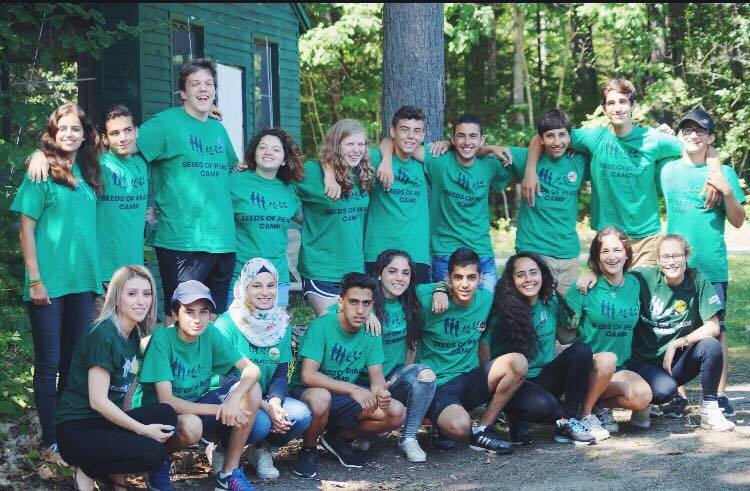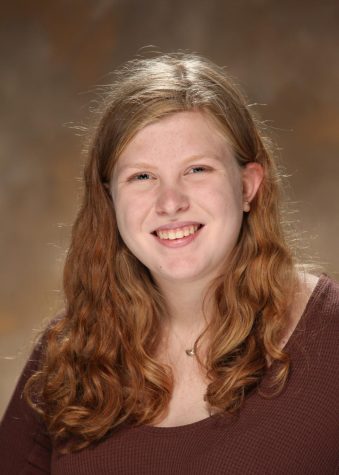Seeds grow beyond their roots
photo courtesy of Amelia Davidson
Davidson poses with her dialogue group. The group, which was comprised of people from the U.S. and across the Middle East, spent two hours each day discussing the Arab-Israeli conflict, as well as doing daily sport and arts activities.
August 29, 2017
I had never even heard a national anthem in any language beside English and Hebrew. But there I was, standing in respect for the Palestinian national anthem as people around me sang with pride. I stood surrounded by people singing in foreign languages and making fun of how pale my skin is. I could not have felt more different, and yet somehow these people would become my safety net, and this place would begin to feel like home.
This summer, I spent three-and-a-half weeks at Seeds of Peace International Camp in Maine. For those three-and-a-half weeks I played sports, talked, joked, debated, laughed and cried alongside 180 Americans, Israelis, Palestinians, Egyptians, Jordanians, Indians and Pakistanis.
Seeds of Peace revolves around dialogue sessions where we discuss conflict. There are two simultaneous programs: the Middle East program, which discusses the Arab-Israeli conflict, and the South Asia program, which discusses the India-Pakistani conflict. I participated in the Middle East program, so I spent my days with people from the Middle East, but I actually lived in a South Asia bunk, so I had the unique opportunity to bond with people who come from radically different lifestyles.
It is hard to even articulate how incredible and transformative the experience was. I came in expecting to learn and make some friends, but I could not have possibly imagined how close I would become to people who I would have previously considered to be an adversary simply because of where they came from.
That is not to say it was all perfect or easy. Seeds of Peace certainly is not the type of place where you end up agreeing to make peace and then sing Kumbaya. The dialogue sessions, which lasted for two hours each day, were extremely difficult. There was screaming, crying, chair throwing, you name it. I heard things that prior to Seeds, I would not have believed I had the strength to endure without a fight. But I did endure them, and they changed me.
Most people who know me know that I am not the type of person to listen to an argument without sharing my opinion. But coming to Seeds, I promised myself that I would try to listen to all sides so that I could come away from the experience with a greater understanding of the different narratives surrounding the Israeli-Palestinian conflict. While difficult at times, I was able to restrain myself and truly listen to what others had to say, and I do not regret that for a second.
The most common question I’ve gotten since coming back from Seeds is, “Did it change your political opinions?” At first, I had a really hard time answering that. But after reflecting for a few weeks, I think that the experience taught me more about my own opinions rather than change them.
I came into Seeds of Peace supporting Israel, while recognizing that there were serious flaws on all sides. At camp, I heard absolutely heartbreaking stories from my Palestinian friends, and I learned pretty quickly that I was often simply unable to justify Israel’s actions. Nevertheless, I never once wavered in my support for Israel as a whole, which taught me that my love for Israel runs deeper than political logic or reason.
The one clear transformation in my views is that Seeds made me less naïve. Before Seeds, it was easy for me to just say, “Yes, of course peace is possible if we work hard enough.” But sitting in dialogue on the first day and hearing the shouting, the crying and the hatred coming from both sides, I felt that entire notion falling apart.
Outside of the dialogue sessions, I saw the Palestinians and Israelis who were screaming at each other just hours earlier sitting and joking around, and I would be dumbfounded that people whose political beliefs differed so much were able to put that behind them and become friends. I saw that with my friendships too; some of my best friends from Seeds are Arabs who told me that before they came to Seeds they had never met a Jew, nor had they particularly wanted to. I myself had no Arab or Muslim friends before Seeds, and I never really paused to think about that. But now, it seems crazy that it took me 16 years to even meet some of the most incredible people I’ve ever met.
The Arab poet Rumi wrote, “Out beyond ideas of rightdoing and wrongdoing there’s a field. I’ll meet you there.” Painted on one of the central buildings on the camp field is the phrase “This is the field…” to pay homage to that quote. It almost shocks me how accurately those words describe life at Seeds. We truly were able to go beyond ideas of right and wrong and ideas about conflict that had been ingrained in us since birth. While we didn’t exactly leave them behind, we succeeded in rising above them and forming bonds that transcend those differing opinions. It was impossible, and painful, and some days it is crazy for me to believe that it really happened. But it did.
Leaving Seeds was one of the most difficult things that I have ever done, and describing the experience without sounding incredibly cheesy and fake is almost as hard. There have also been some hard moments with my friends from Seeds since the experience ended, like having to explain to a Palestinian friend why I can’t exactly come visit her in the West Bank, or discussing the violence in Jerusalem in the past month with both Palestinians and Israelis who live in Jerusalem.
But for every one of those difficult discussions there has been a beautiful moment when someone paused the conversation to say, “No matter what we believe, you know I love you, right?” And the fact that those relationships exist, against all odds, is what at the end of the day gives me hope.









Lori Gale • Sep 15, 2017 at 11:16 pm
Amelia, what an unbelievable experience you had. Thanks for sharing it so beautifully.